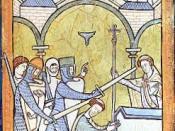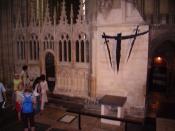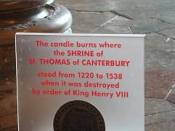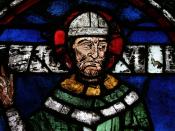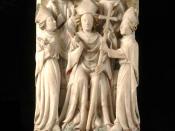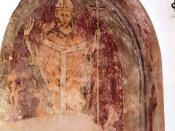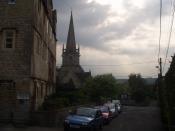St. Thomas a Becket was Archbishop of Canterbury, the highest position of the English church. He was born December 21, on or about the year 1118, and died at Canterbury on December 29, 1170. His parents, originally from Normandy, had settled in England quite a few years before. When Thomas was of age, he learned reading at Merton Abbey, and then continued his studies in Paris. After leaving school he began secretarial work. Thomas was quite obviously an extraordinary young man able to impress men of station and power with his intellect and as a trustworthy advisor. A very few years after leaving school Thomas gained a position in the service of Theobald, then Archbishop of Canterbury. The house's master took favor of Thomas and he became one of his most trusted clerks. Thomas had an obvious gift and Theobald recognized his potential, providing for him to go and study civil and cannon law at Bologna and Auxerre.
Thomas was later ordained deacon by the Archbishop in 1154, after which he bestowed several preferments upon him, the most important being the Archdeaconry of Canterbury.
When King Stephen died the young heir Henry became monarch and the new master of the kingdom as Henry II. Consistent with his rapid rise to power, Becket was chosen as his chancellor, and at the age of thirty six became the most powerful subject in Henry's wide dominions. As is the privilege and power of the King of England, Becket was ordained priest on Saturday and consecrated bishop the next day, Sunday, June 3rd, 1162. It seems that St. Thomas obtained for England the privilege of keeping the feast of the Blessed Trinity on that Sunday, the anniversary of his consecration.
Thomas acted as justice itinerant for three countries in 1153. Six years later he organized Henry's expedition to Toulouse and, though it seems unlikely that the imposition of "scrutage" was called into existence for that occasion, still Thomas undoubtedly pressed the exacting of this money contribution in lieu of military service and enforced it against ecclesiastics in such a way that bitter complaints were made of the disproportionately heavy burden this imposed upon the Church. In military operations Thomas physically participated as well as taking part as a leader, and Garnier, a French chronicler who lived to write of the virtues of St. Thomas and his martyrdom, declares that in these encounters he saw Becket unhorse many French knights.
In spite of his success and accomplishment, St. Thomas a Becket did not consider himself adequately noble or virtuous. As Chancellor, Becket clearly recognized the struggles he faced and gave himself to fasting and disciplines, hair shirts, protracted vigils, and constant prayers. Yet, in 1158 Thomas went to France to negotiate a marriage treaty and he traveled with such splendor that the commoners said: "If this be only the chancellor what must be the glory of the king himself?" His conflict between his public roles and private perception of self finally led him to conclude that he was not sufficiently noble of action or thought and, contrary to the wishes of the king, he resigned as Chancellor.
On December 29th, 1170, Thomas Becket was murdered in Canterbury cathedral by Henry's partisans. Shocked and in mourning of Thomas's death, the Christian world forced the king to do penance at the saint's tomb in Canterbury. This didn't happen until 4 years after Thomas' death. Because of Thomas, Canterbury became the greatest of English shrines.
